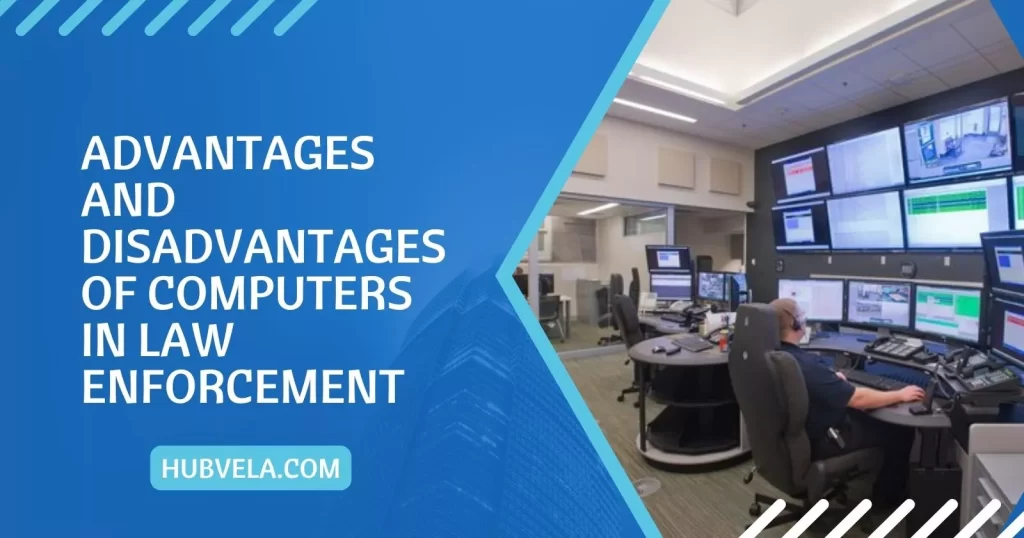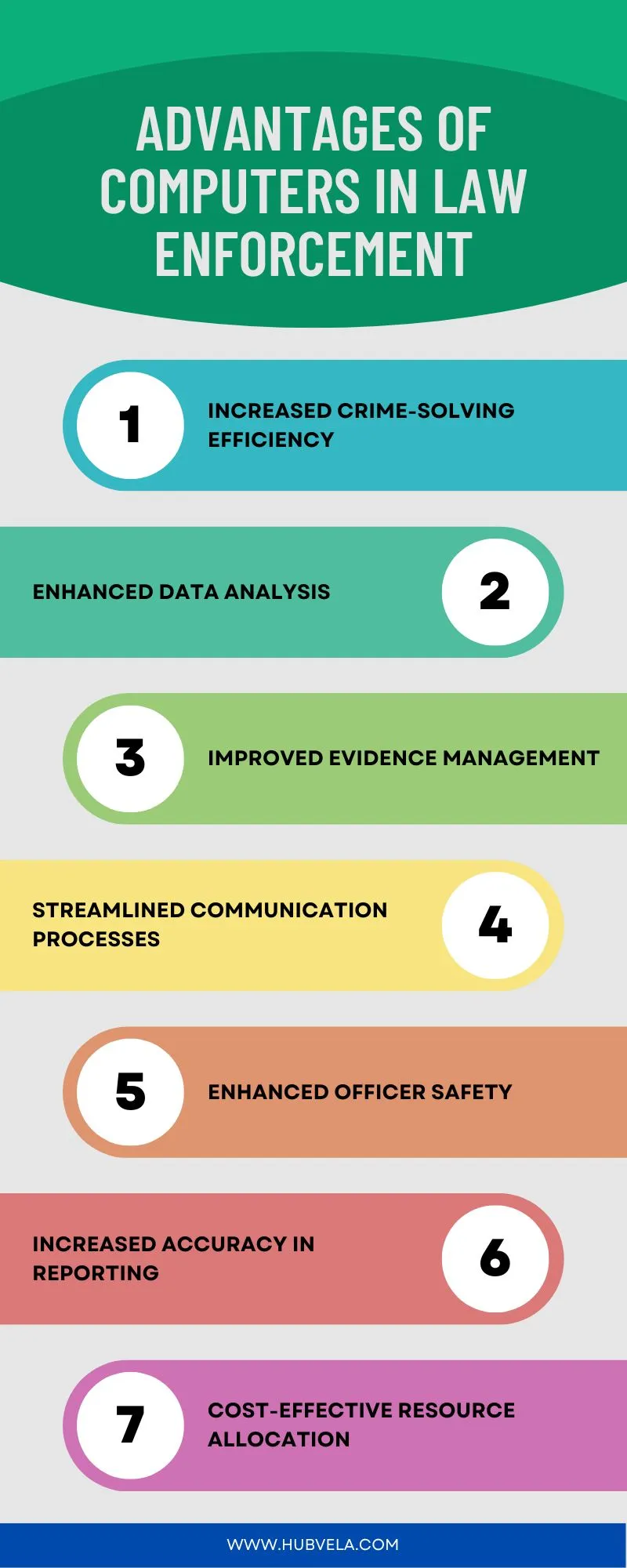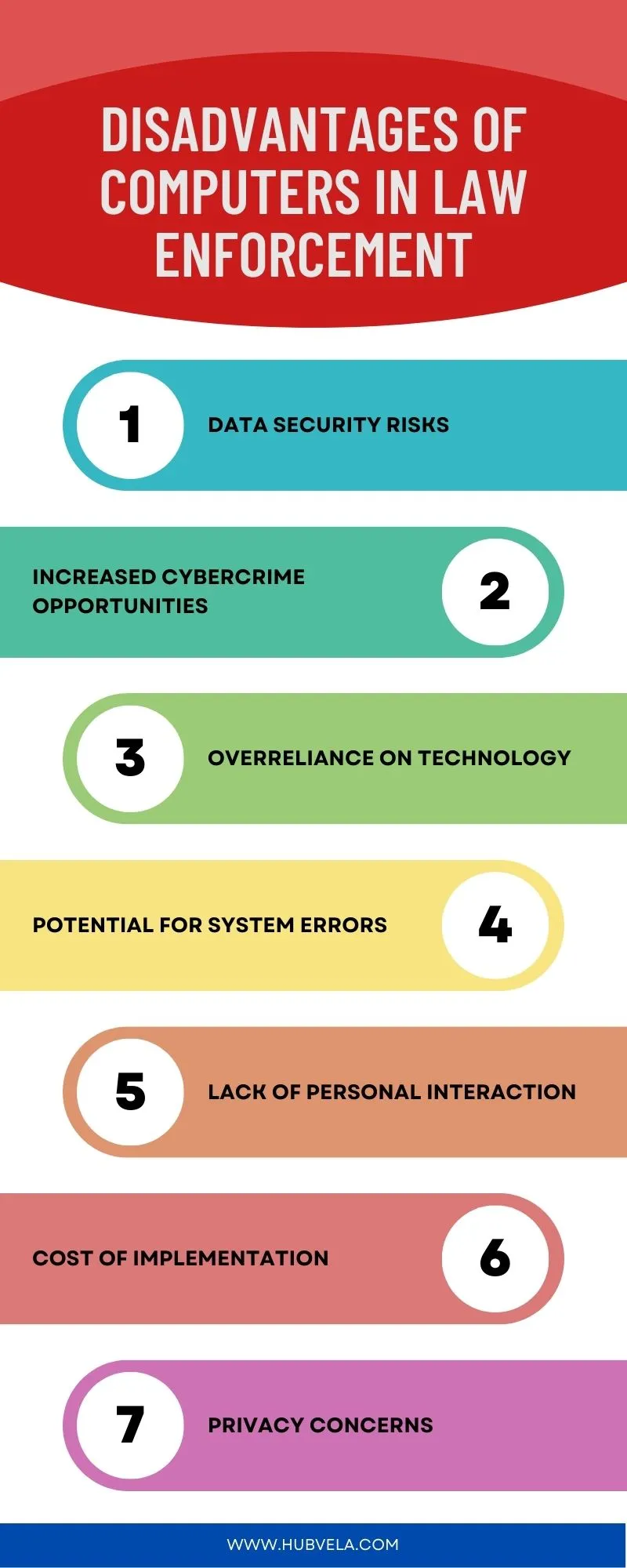You might be skeptical about the use of computers in law enforcement, thinking that traditional methods are more effective. However, it’s important to consider the advantages and disadvantages that computers bring to the table.
Computers have revolutionized the way law enforcement agencies operate, offering numerous benefits. They allow for increased crime-solving efficiency, enhanced data analysis, improved evidence management, and streamlined communication processes.
However, it’s not all positive. Computers also come with drawbacks, such as the lack of personal interaction, the cost of implementation, and privacy concerns.
Despite these disadvantages, the advantages of utilizing computers in law enforcement cannot be ignored. In this article, we will delve into the advantages and disadvantages of computers in law enforcement, providing a comprehensive analysis of this issue.

--Advertisement--
Advantages of Computers in Law Enforcement
The use of computers in law enforcement has significantly improved the efficiency and effectiveness of police work. We will discuss the various advantages of using computers in law enforcement, including:

1. Increased Crime-Solving Efficiency
Computers greatly enhance your ability to solve crimes more efficiently and effectively. Through advanced technology, computers aid in various aspects of crime-solving, including crime prevention, data integration, real-time tracking, evidence authentication, and resource optimization.
Firstly, computers play a crucial role in crime prevention. The integration of data from various sources allows law enforcement agencies to identify patterns, analyze trends, and predict potential criminal activities. This proactive approach helps prevent crimes before they even occur.
Furthermore, real-time tracking capabilities provided by computers enable law enforcement to monitor suspects and gather crucial evidence. With the ability to track suspects’ movements, law enforcement can respond swiftly, increasing their chances of apprehending criminals and preventing further harm.
Computers also facilitate evidence authentication, ensuring the credibility and reliability of collected evidence. Advanced forensic tools and software aid in analyzing and validating evidence, strengthening the case against criminals and increasing the chances of successful prosecution.
Lastly, computers optimize the allocation of resources in crime-solving efforts. Through data analysis and predictive modeling, law enforcement agencies can allocate their resources effectively, prioritizing high-risk areas and focusing on the most pressing cases.
2. Enhanced Data Analysis
By utilizing advanced technology, law enforcement agencies can significantly enhance their data analysis capabilities, allowing them to uncover valuable insights and patterns in criminal activity.
With the help of sophisticated data analysis techniques, such as predictive modeling and data visualization, law enforcement agencies can better understand crime trends and patterns.
Predictive modeling uses historical data to identify potential future criminal activity, enabling law enforcement to allocate resources efficiently and prevent crime before it occurs.
Data visualization tools provide a visual representation of complex data sets, making it easier to identify patterns and trends.
Real-time analytics allow law enforcement to analyze data as it’s generated, enabling them to respond quickly to emerging threats.
3. Improved Evidence Management
To further enhance your ability to manage evidence effectively, computers in law enforcement offer significant advantages.
One of the main advantages is improved organization. With the use of computers, evidence can be stored and categorized in a systematic manner, making it easier to locate and track. This leads to efficient retrieval of evidence when needed for investigations or court proceedings.
Additionally, computers enable digital preservation of evidence, eliminating the risk of physical damage or loss.
Streamlined processes are another benefit, as computers allow for the automation of tasks such as logging, tracking, and chain of custody documentation.
Finally, computers provide centralized control over evidence management systems, allowing for better coordination and collaboration among law enforcement agencies.
4. Streamlined Communication Processes
With improved evidence management, you can now seamlessly streamline communication processes in law enforcement through the use of computers. This advancement in technology allows for efficient coordination and improved response time in critical situations.
By integrating computers into law enforcement operations, communication channels are enhanced, leading to streamlined communication between different departments and agencies. With the click of a button, officers can easily share information, eliminating the need for time-consuming paperwork or manual data entry. This seamless information sharing not only saves time but also ensures that all relevant parties have access to crucial information when needed.
Additionally, computers facilitate enhanced teamwork among law enforcement personnel, as they can collaborate on cases, share updates, and coordinate efforts efficiently.
5. Enhanced Officer Safety
Improving officer safety, computers in law enforcement provide enhanced capabilities.
With the help of computers, officers can access comprehensive databases that contain crucial information about potential suspects, allowing them to make informed decisions during encounters.
Moreover, computers aid in officer training by providing interactive simulations and virtual reality scenarios that help officers practice responding to dangerous situations. This training contributes to their preparedness and improves their ability to handle high-stress incidents.
Computers also play a significant role in crime prevention, as they enable officers to analyze data and identify patterns, helping to predict and prevent criminal activities.
Additionally, surveillance technology integrated with computers allows for real-time monitoring, enhancing officer safety during critical operations.
Through community engagement initiatives facilitated by computers, law enforcement agencies can build trust and foster cooperation, leading to a safer environment.
6. Increased Accuracy in Reporting
By utilizing computers in law enforcement, you can significantly increase the accuracy in reporting criminal incidents.
Computers provide increased efficiency and data accuracy in the reporting process. With real-time reporting capabilities, officers can enter information directly into the system, ensuring that all details are accurately recorded. This eliminates the risk of human error that can occur when manually writing reports.
Additionally, computers reduce paperwork by storing all information digitally, making it easily accessible and searchable. This not only saves time but also reduces the chances of misplacing or losing important documents.
The improved decision-making capabilities of computers also contribute to increased accuracy in reporting. With access to comprehensive and up-to-date information, law enforcement personnel can make informed decisions based on reliable data, leading to more accurate and effective reporting of criminal incidents.
7. Cost-Effective Resource Allocation
Utilizing computers in law enforcement allows you to effectively allocate resources in a cost-efficient manner. With the help of computer systems, law enforcement agencies can achieve resource allocation efficiency by optimizing their budgets and improving resource utilization.
By utilizing advanced software and data analysis tools, agencies can effectively manage their resources, ensuring that they’re allocated to the areas that need them the most. Computers also enable streamlined resource distribution, allowing agencies to quickly and accurately distribute resources to different departments or units based on their needs and priorities.
This not only helps to optimize the use of available resources but also ensures that critical tasks are addressed promptly. Overall, computers play a vital role in enabling effective resource management in law enforcement, leading to improved operational efficiency and cost savings.
Disadvantages of Computers in Law Enforcement
Technology has played a significant role in law enforcement, offering numerous advantages such as increased productivity, improved officer safety, and more efficient crime-solving.
However, there are also disadvantages to the widespread use of computers and technology in law enforcement. We will discuss the drawbacks of computers in law enforcement, including:

1. Data Security Risks
Protecting data from unauthorized access is a significant concern for law enforcement agencies using computers. Data breaches and hacking risks pose serious threats to the security and integrity of sensitive information.
Law enforcement agencies handle vast amounts of data, including personal and confidential information, making data privacy a critical aspect to consider. Insider threats also add to the data security risks, as employees or individuals with access to the system may misuse or leak sensitive data.
To mitigate these risks, law enforcement agencies must implement robust cybersecurity measures. This includes implementing strong access controls, encryption protocols, and regular security audits.
2. Increased Cybercrime Opportunities
To address the increased cybercrime opportunities,
you must be vigilant in implementing proactive measures against unauthorized access and data breaches.
Cybercrime prevention should be a top priority in law enforcement agencies.
This includes investing in robust cybersecurity training for officers to stay updated on the latest threats and prevention techniques.
Digital evidence collection is also crucial in combating cybercrime.
Law enforcement agencies should enhance their capabilities in collecting and preserving digital evidence,
as well as utilizing technological advancements in forensic analysis to uncover critical information.
Additionally, online surveillance techniques can be employed to monitor suspicious activities and identify potential cybercriminals.
By staying proactive and embracing technological advancements,
law enforcement agencies can effectively combat the rising cybercrime challenges and protect communities from digital threats.
3. Overreliance on Technology
By relying too heavily on technology, you may risk compromising the effectiveness and efficiency of law enforcement operations. Overreliance on computers in law enforcement can have serious consequences.
One of the main risks is the potential for human error. Technology isn’t perfect and can sometimes lead to inaccurate or incomplete information being presented. This can have serious implications in criminal investigations and court proceedings.
Additionally, overreliance on technology can lead to a lack of proper training for law enforcement personnel. It’s important for officers to have a solid understanding of investigative techniques and procedures, rather than solely relying on computer systems.
Ethical dilemmas can also arise when relying too heavily on technology, such as privacy concerns and potential misuse of data.
4. Potential for System Errors
You may encounter potential system errors when relying on computers in law enforcement due to their reliance on technology. System malfunctions, software glitches, and data loss are some of the potential errors that can occur.
Technological failures can lead to serious consequences in law enforcement operations. For example, a system malfunction could result in critical information being inaccessible or corrupted, hindering investigations and compromising the justice process.
Software glitches may cause errors in data analysis or reporting, leading to incorrect conclusions or wasted resources. Moreover, data loss can occur due to hardware failures or cyberattacks, resulting in the loss of valuable evidence or sensitive information.
It’s important for law enforcement agencies to have robust backup systems and contingency plans to mitigate the risks associated with potential system errors.
5. Lack of Personal Interaction
One drawback of relying on computers in law enforcement is the limited personal interaction they provide, which can hinder effective communication and relationship-building within the community.
Decreased community engagement is a consequence of this lack of personal interaction. When investigations become impersonal, it becomes harder to establish trust and connect with individuals involved. This impersonality also leads to limited empathy development, as officers may struggle to understand the emotions and experiences of those they serve.
Non-verbal communication skills, such as reading body language and facial expressions, are also compromised when relying solely on computers.
All of these factors contribute to reduced trust building within the community, which is crucial for effective law enforcement.
Finding ways to balance the use of computers with personal interaction is essential to overcome these disadvantages and maintain strong community relationships.
6. Cost of Implementation
Implementing computers in law enforcement can come with significant financial burdens, potentially straining department budgets and resources. The cost of implementation, including purchasing hardware and software, training personnel, and maintaining the system, can be quite high.
Budget constraints may limit the ability of law enforcement agencies to invest in the necessary technology and infrastructure.
The financial implications of implementing computers in law enforcement should be carefully considered, as they can have long-term effects on the department’s ability to fulfill its mission.
Conducting a cost-benefit analysis can help determine if the benefits of computerization outweigh the expenses. Resource allocation becomes critical as departments must prioritize their spending and determine the most essential areas where computers can be effectively utilized.
It’s important for law enforcement agencies to carefully plan and budget for the implementation of computers to ensure the best use of limited resources.
7. Privacy Concerns
The potential invasion of privacy associated with computerization in law enforcement can pose significant concerns for individuals and their personal information. One of the main disadvantages is the increased risk of data breaches.
As more personal data is stored and transferred electronically, the possibility of unauthorized access and theft becomes higher. This can lead to identity theft and other fraudulent activities.
Additionally, there are surveillance concerns. The use of advanced technologies like facial recognition and predictive analytics can raise questions about the extent of surveillance on individuals.
This can have legal implications, as it may infringe upon constitutional rights and privacy laws.
Furthermore, privacy concerns can erode public trust in law enforcement agencies, impacting their ability to effectively serve and protect communities.
Ethical considerations also come into play, as the use of personal data must be done responsibly and with the utmost respect for privacy rights.
Conclusion on Advantages and Disadvantages of Computers in Law Enforcement
To summarize, as you consider the advantages and disadvantages of computers in law enforcement, it’s clear that their integration has proven to be both beneficial and challenging.
The pros and cons of utilizing computers in law enforcement have been thoroughly examined and debated. On one hand, computers have greatly improved efficiency and accuracy in various law enforcement tasks such as data analysis, crime mapping, and evidence management.
They’ve also enhanced communication and information sharing among law enforcement agencies.
However, the use of computers has brought about concerns regarding privacy, cybersecurity, and potential misuse of data.
Overall, the impact of computers in law enforcement has been significant, but it’s important to strike a balance between utilizing technology and safeguarding individual rights.


